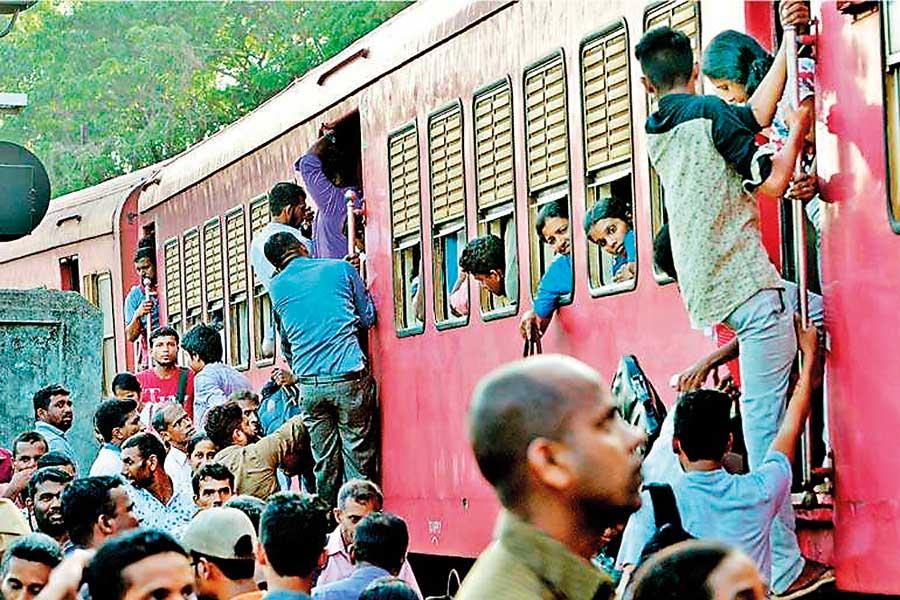19 Sep 2022 - {{hitsCtrl.values.hits}}

Experts last week made a strong case as to why Sri Lankans should embrace public transport as part of their everyday life and make private vehicle use restrained as much as possible after the country plunged into its worst balance of payment crisis bringing its transport system to a near standstill.
Speaking at a webinar, the University of Moratuwa Senior Professor, Amal Kumarage showed that at the current global prices, oil will account for a third of total imports or US$ 6.5 billion for Sri Lanka to maintain its pre-crisis level consumption and asked how it could be possible for a non-oil producing country to spend such a colossal amount at a time when foreign exchange is hard to come by.
He also showed Sri Lanka’s transport sector absorbing up to 62 percent of total oil imports, making it highly energy-inefficient.
“This is actually the reason why we are where we are today. And if you really look at the most significant reasons why Sri Lanka has a dollar crisis, transport is one of them”, Professor Kumarage said delivering the keynote address of a webinar titled, ‘ Rethinking Sri Lanka’s Transport and Logistics Sector,’ organised by the Centre for Banking Studies of the Central Bank.
The persistent dollar shortage which came to a head in June unravelled Sri Lanka’s transport sector crisis, which was decades in the making as private vehicle owners had to stay in days-long queues to refuel their vehicles while those who were forced to take up public transport experienced how unfit it is to use as their mainstream transport mode.
Sri Lankans are now witnessing the harsh reality of the dilapidated state of their transport system due to decades-long neglect and under-investment in public transport blinded by vanity projects delivered by the politicians without a proper integrated transport policy.
“In Sri Lanka, we have this problem whether the stakeholders who appoint the governments really want the policy-driven governance because if you look at political manifestos, they have very little policy but are full of projects,” Professor Kumarage pointed out.
“And Sri Lankan voters are captivated more by tangible projects than conceptual policies. And it seems that instead of educating the voter of the value of policy-driven governance, we have gone the other way of being very populist in terms of tangible infrastructure to get votes,” he added.
Professor Kumarage blamed not just the politicians but also the bureaucracy for the current sorry state of affairs, which transcend beyond transport sector.
“And also our population does not seem to value policy or at least demand it,” he said with sadness.
Hence, he urged everyone to resist fantasising large capital-incentive transport projects, specially at a time when foreign exchange is in shortage and instead exploit the resources that are already available.
He said Sri Lanka must stop thinking on different modes of transport in silos and instead focus on delivering the desired mobility by the people.
“So, we must integrate buses with railways, buses with private vehicles through park and ride and so on or even non-motorised transport. And then we need to integrate the first mile and the last mile through taxis and through a digital backbone,” he said.
Speaking at the panel discussion that followed Prof. Kumarage’s addres, Romesh David, Chairman, National Logistics Committee, Ceylon Chamber of Commerce went on to suggest that Sri Lanka should continue with fuel rationing for private vehicles even after the crisis abates and making private car use more expensive by taxes and tolls, so that people make the switch to public transport.
“I think we have to continue fuel rationing in some form or shape, making it more expensive to use private vehicles, tax the private cars more, invest in buses and trains and their electrification,” David stressed.
Taking a more hard line, yet an extremely valid viewpoint, David said Sri Lanka must curtail the number of three wheelers and completely do away with school vans which are unnecessary and inflict a massive economic and social cost by way of keeping over a million employable people out of the workforce, who could otherwise contribute meaningfully to national economic development.
David proposed many should be able to either walk or cycle for the last mile connectivity and part of the investments which are earmarked for roads could be diverted to build better walking areas with livable and cleaner cities.
Meanwhile weighing in on the matter, Dr. T. Sivakumar, Former President, Sri Lanka Society of Transport and Logistics and the Senior Lecturer, University of Moratuwa proposed some of the push and pull strategies the government could roll out to get people to use public transport more.
He acknowledged that while there is willingness to make the shift from private vehicles to public transport by the travellers as seen during the worst of the fuel crisis, lack of quality in public transport acts as a deterrent to make that shift permanent.
Hence, he proposed to add convenience, comforts and the speed to make it indifferent between the private and public transport use while imposing parking restrictions and restrictive pricing on private vehicle use such as carbon taxes and automatic tolls to push people from private to public transport.
While nobody should be prevented from owning a private vehicle, Dr. Sivakumar said its use must be made expensive.
All three experts agreed that the current economic crisis offers the best opportunity to introduce the much-needed reforms to the country’s transport sector to make public transport the mainstay.
07 Nov 2024 30 minute ago
07 Nov 2024 40 minute ago
07 Nov 2024 2 hours ago
07 Nov 2024 3 hours ago
07 Nov 2024 5 hours ago